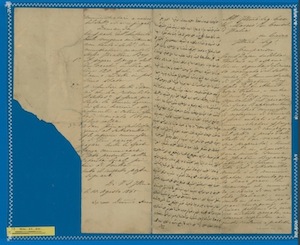The affair of the purloined cows, T-S Misc.22.310
Although the majority of the material preserved in the Taylor-Schechter Genizah Collection comes from the periods of Fatimid and Ayyubid rule in Egypt, it is not unusual to come across much earlier or much later material. The fragment T-S Misc.22.310, that was brought to my attention by my collegue Dr Amir Ashur, belongs clearly to the latter group: at the bottom of f. 2v it bears the date August 10th 1865 together with the signature of the petitioner, an Italian subject, Jacub Dayyan. The fragment is a large paper bifolium and each of its leaves was folded in two on its width, thus dividing the writable surface into eight columns. Four columns are filled with the Italian text of the petition in a large, elegant and very slanted handwriting, which is easily legible; one and a half columns contain Arabic text, written in a seemingly clear – yet actually quite impenetrable – script, which appears to be an abridged version of the Italian document.
The petition is addressed to the Illustrissimo Signor Cavaliere Licurgo Macciò Regio Console d’Italia in Cairo, the Royal Italian consul in Cairo, and it deals with a private matter, the subtraction, detention and exploitation of a pair of cows belonging to the petitioner, Jacub Dayyan, by an administrator of His Excellence Ibrahim Bey. The document appears to be a follow-up to a previous complaint by Jacub, who accused Ibrahim Bey’s administrators thus:
[f. 1r, ll. 19–26] essere entrati con forza nella casa di campagna del sottoscritto e preso dalla stalla le due vacche di sua proprietà e tenute le vacche in sequestro (the fact that the aforementioned administrators entered by force the country house of the undersigned and took from the stable the two cows in his property and sequestered them).
It becomes apparent that this first complaint alarmed the administrators of the Bey who recognized
[f. 1r, ll. 32–40] quanto siano gravi le mancanze che commisero a carico di un suddito italiano e conoscendo in pari tempo le gravi conseguenze che derivar potevano da questo loro indebito operato (the seriousness of their actions against an Italian subject and knowing at the same time the serious consequences that could derive from their misdeeds).
Nevertheless they decided not to give the cows directly back to their owner, but tried instead to persuade one of his servants to collect the animals from the administrators’ stables. The wise servant did not accept the cows back since he was aware that their legal owner should check their state of health. To the servant’s eyes, this attempted restitution looked distinctly suspicious because he
[f. 1v, ll. 21–29] ha veduto che i detti animali erano ridotti in cattivo stato, per averli mancato il nutrimento necessario, mentre li facevano menare dei lavori faticosi nei terreni di Ibrahim Bey (saw the bad condition in which the cows were laying due to the lack of appropriate nourishment while they were performing heavy duties in Ibrahim Bey’s lands).
Adding misdeed to embezzlement, the administrators finally resolved to sneak the cows back to Jacub Dayyan’s stables at night, as if they were naïvely thinking that their actions would pass unnoticed. This was not the case: the present petition shows Jacub’s resolve to claim a refund for their misdeeds and for their serious consequences: the absence of the cows from Jacub’s properties for 29 days prevented the vital irrigation of his cotton plantations and led to the potential loss of the crop. Jacub Dayyan’s requests are stated in three clear points at the end of the petition and are directed against Ibrahim Bey as being responsible for the administrators and their criminal actions:
[f. 2v, ll. 3–26] Domanda: che per la parte dell'autorità locale vengano condannati, non tanto i suddetti amministratori, quanto lo stesso Ibrahim Bey (He asks: that the local authority will condemn Ibrahim Bey himself, more then the aforementioned administrators):
1) a pagare il prezzo delle due vacche, in lire sterline 120, perché le hanno ridotte in pessimo stato (to pay the price of the two cows, 120 lire-sterling, since they have caused their awful condition);
2) a rifondere tutti i danni che ha risentito il sottoscritto per essersi guastata la seminagione dei suoi terreni e specialmente i cotoni, essendoli mancata l'acqua per loro colpa (to refund all the losses that the undersigned suffered since the planting of his lands, in particular the cotton fields, was damaged, because they caused there to be a shortage of water);
3) a darsi prima soddisfazione al sottoscritto per le ingiurie commesse al di lui carico e pagare tutte le spese (to give satisfaction to the undersigned for all misdeeds committed against him and to pay all the expenses).
As I hope this brief note shows, the thematic variety and the chronological span embraced by the material of the Taylor-Schechter Genizah Collection can prove to be of interest to scholars whose focus lies well outside the usual ‘Classical Genizah Period’.
T-S Misc.22.310, ff. 1r and 2v, a petition in Italian and Arabic
Cite this article
(2011). The affair of the purloined cows, T-S Misc.22.310. [Genizah Research Unit, Fragment of the Month, March 2011]. https://doi.org/10.17863/CAM.56321
If you enjoyed this Fragment of the Month, you can find others here.
Contact us: genizah@lib.cam.ac.uk
The zoomable images are produced using Cloud Zoom, a jQueryimage zoom plugin:
Cloud Zoom, Copyright (c) 2010, R Cecco, www.professorcloud.com
Licensed under the MIT License

